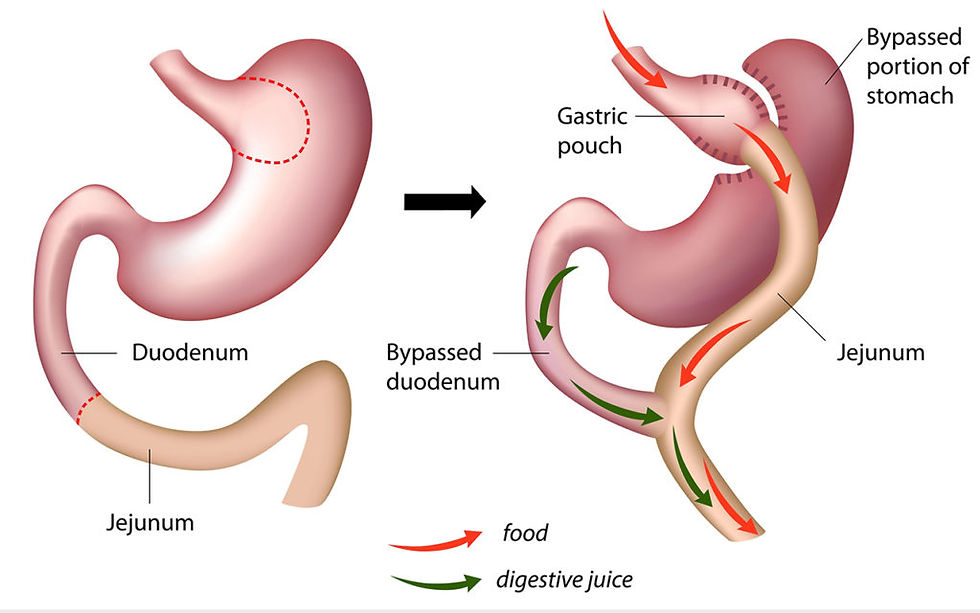Tube Stomach in The Surgical Treatment of Obesity? Is Roux-En-Y Gastric Bypass?
- Prof.Dr. Abdulkadir Bedirli
- Dec 20, 2022
- 3 min read
Updated: May 9, 2023
It is not correct to say that any of the surgical approaches applied in the treatment of obesity is suitable for all morbidly obese patients. The surgeries to be performed vary according to the patient's unique condition. These specific conditions are the person's BMI, eating habits, age, metabolic status, obesity-related diseases (cardiovascular diseases, diabetes, hyperlipidemia, joint disease, sleep apnea, infertility), other existing health problems, and even how much weight the person wants to lose.
In the surgical treatment of morbid obesity, sleeve gastrectomy and Roux-en-Y gastric bypass surgery are the most frequently performed operations today. So, tube stomach or Roux-en-Y gastric bypass in morbidly obese patients, which one should we choose? In order to answer this question, it is necessary to determine the advantages and disadvantages of both surgeries against each other.
The differences between sleeve gastrectomy and Roux-en-Y gastric bypass are as follows:
Gastric sleeve surgery is an easier procedure than Roux-en-Y gastric bypass surgery.
Complications arising from surgery are similar to each other.
After both surgeries, multi-vitamin and mineral preparations are needed. Especially folic acid, B12, copper and calcium replacements are important for sleeve gastrectomy, Vitamin D, calcium and iron replacements are important for Roux-en-Y gastric bypass.
The problem of regaining weight is common after sleeve gastrectomy, especially in morbidly obese patients with high sugar consumption.
Roux-en-Y gastric bypass or duodenal switch surgery should be preferred instead of tube stomach in superobese patients with a BMI over 50.
Roux-en-Y gastric bypass surgery should not be performed in patients with inflammatory bowel diseases.

Considering the above scientific data, the indications of sleeve gastrectomy surgery, which only has a restrictive effect, and Roux-en-Y gastric bypass surgery, which has both more restriction and absorption-reducing effects, are similar, except for exceptional cases. The decision to have surgery for morbid obesity is an important step. However, the surgery to be performed and its technique are of much greater importance. In scientific studies, it is seen that the short-term success of sleeve gastrectomy surgery in terms of weight loss and improvement in obesity-related diseases is close to Roux-en-Y gastric bypass surgery.
We cannot talk about the long-term results of bariatric surgery, 10 years or 20 years later, as definitively as the Roux-en-Y gastric bypass surgery regarding tube stomach surgery. When we look at the literature, we can reach all kinds of studies that give positive results about the surgery preferred by each surgeon. However, what is correct is to examine scientific studies with high evidential value, to evaluate the guidelines published in the USA, where this surgery is performed intensively, and to combine those data with the surgeon's own experience.
When we consider patients who need revisional surgery as a result of weight regain problems after sleeve gastrectomy surgery, the importance of surgical selection increases even more. Gastric band application, which is intensively applied for bariatric surgery, is rarely applied today. It is natural that it raises questions about what awaits us in the long term regarding tube stomach.
In the 60-year history of bariatric surgery, we see that many surgical procedures were presented, developed and adapted, however, many surgical procedures were abandoned due to unacceptable complications. Of these surgeries, only Roux-en-Y gastric bypass surgery has stood out by itself, thanks to its durable, effective and safe features.
Thanks to robotic surgery, performing the gastro-intestinal mouth opening, which is the most difficult stage of Roux-en-Y gastric bypass surgery, makes it possible for surgeons with robotic experience to perform this surgery more intensively with the robotic method. The majority of the morbidly obese patients in our portfolio consist of patients who underwent Roux-en-Y gastric bypass surgery with the robotic method.
When performed by surgeons with laparoscopic and/or robotic experience in this field, Roux-en-Y gastric bypass surgery, which is defined as the gold standard all over the world, is a better option than sleeve gastrectomy surgery for morbidly obese patients.







